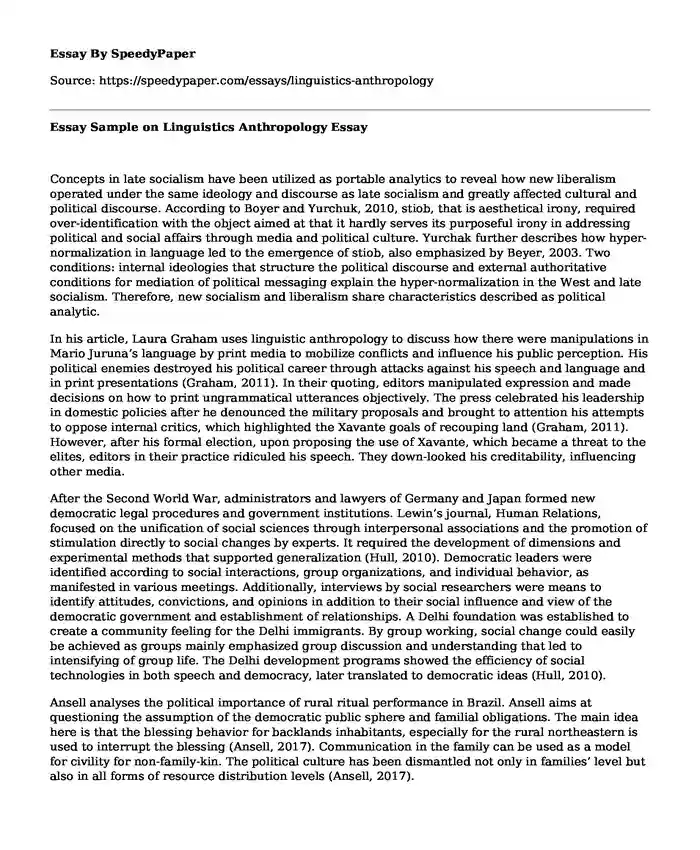
| Type of paper: | Essay |
| Categories: | Politics Political science Anthropology Media |
| Pages: | 3 |
| Wordcount: | 741 words |
Concepts in late socialism have been utilized as portable analytics to reveal how new liberalism operated under the same ideology and discourse as late socialism and greatly affected cultural and political discourse. According to Boyer and Yurchuk, 2010, stiob, that is aesthetical irony, required over-identification with the object aimed at that it hardly serves its purposeful irony in addressing political and social affairs through media and political culture. Yurchak further describes how hyper-normalization in language led to the emergence of stiob, also emphasized by Beyer, 2003. Two conditions: internal ideologies that structure the political discourse and external authoritative conditions for mediation of political messaging explain the hyper-normalization in the West and late socialism. Therefore, new socialism and liberalism share characteristics described as political analytic.
In his article, Laura Graham uses linguistic anthropology to discuss how there were manipulations in Mario Juruna’s language by print media to mobilize conflicts and influence his public perception. His political enemies destroyed his political career through attacks against his speech and language and in print presentations (Graham, 2011). In their quoting, editors manipulated expression and made decisions on how to print ungrammatical utterances objectively. The press celebrated his leadership in domestic policies after he denounced the military proposals and brought to attention his attempts to oppose internal critics, which highlighted the Xavante goals of recouping land (Graham, 2011). However, after his formal election, upon proposing the use of Xavante, which became a threat to the elites, editors in their practice ridiculed his speech. They down-looked his creditability, influencing other media.
After the Second World War, administrators and lawyers of Germany and Japan formed new democratic legal procedures and government institutions. Lewin’s journal, Human Relations, focused on the unification of social sciences through interpersonal associations and the promotion of stimulation directly to social changes by experts. It required the development of dimensions and experimental methods that supported generalization (Hull, 2010). Democratic leaders were identified according to social interactions, group organizations, and individual behavior, as manifested in various meetings. Additionally, interviews by social researchers were means to identify attitudes, convictions, and opinions in addition to their social influence and view of the democratic government and establishment of relationships. A Delhi foundation was established to create a community feeling for the Delhi immigrants. By group working, social change could easily be achieved as groups mainly emphasized group discussion and understanding that led to intensifying of group life. The Delhi development programs showed the efficiency of social technologies in both speech and democracy, later translated to democratic ideas (Hull, 2010).
Ansell analyses the political importance of rural ritual performance in Brazil. Ansell aims at questioning the assumption of the democratic public sphere and familial obligations. The main idea here is that the blessing behavior for backlands inhabitants, especially for the rural northeastern is used to interrupt the blessing (Ansell, 2017). Communication in the family can be used as a model for civility for non-family-kin. The political culture has been dismantled not only in families’ level but also in all forms of resource distribution levels (Ansell, 2017).
The article by Larson, Debating, and Debate that is no Debate, political manifestations, and cultural periodicals in which some intellectuals’ debates took place are explored. The discussions, however, resulted in claims against each other, and accusations of inappropriate conduct often emerged from language ideologies (Larson, 2010). Disputes led to publicity through print media, where justice was determined by public opinion. The socialist communities motivated writers to voice their ideologies and to seek general ideas and not only to condemn social transgressions. Disputants restructured the other party's statement against them in the political attacks and further broadcasted for public view even when expressing truth (Larson, 2010). Moreover, partisan publics overlapped as journalism publications were often related and hardly contrasted.
References
Ansell, A. (2017). Democracy is a blessing: Phatic ritual and the public sphere in Northeast Brazil. Journal of Linguistic Anthropology, 27(1), 22-39.
Boyer, D., & Yurchak, A. (2010). American stiob: or, what latesocialist aesthetics of parody reveal about contemporary political culture in the West. Cultural Anthropology, 25(2), 179-221.
Graham, L. R. (2011). Quoting Mario Juruna: Linguistic imagery and the transformation of indigenous voice in the Brazilian print press. American Ethnologist, 38(1), 164-183.
Hull, M. (2010). Democratic technologies of speech: from WWII America to postcolonial Delhi. Journal of Linguistic Anthropology, 20(2), 257-282.
Larson, J. L. (2010). Debating a Debate That is No Debate? Censure, Publication, and the Contexts of a Moral Order in Slovakia's Velvet Revolution. Journal of Linguistic Anthropology, 20(1), 134-148.
Cite this page
Essay Sample on Linguistics Anthropology. (2023, Aug 02). Retrieved from https://speedypaper.com/essays/linguistics-anthropology
Request Removal
If you are the original author of this essay and no longer wish to have it published on the SpeedyPaper website, please click below to request its removal:
- Personal Mission Statement - Essay Example
- Free Essay Containing Trump Travel Ban Details
- Analytical Summary: Leftover Women - Free Essay on Gender Discrimination
- Essay Samples on Diversity and Knowledge Sharing in the Workplace
- Linguistic Elements of English as the Building Blocks of Literary Styles
- Essay Sample on Maximizing Socioeconomic Diversity in the Workplace for Company Success
- Effects of Media Violence on Children - Paper Sample
Popular categories




